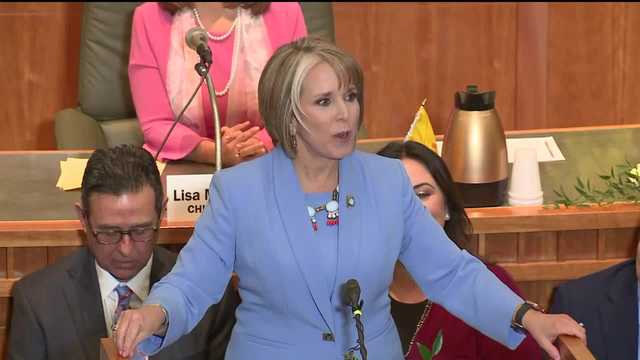New Mexico governor issues stay-at-home order: Find out which businesses can remain open

SANTA FE, New Mexico -- New Mexico Gov. Michelle Lujan Grisham announced Monday a statewide stay-at-home order aimed at fighting the spread of the novel coronavirus.
She said all “non-essential businesses” are ordered to close effective 8 a.m. Tuesday and “100 percent” of the state's non-essential workforce are required to work from home. The order is in effect until April 10.
The announcement came as state officials said New Mexico now had 18 new coronavirus cases bringing the state's total to 83.
The new restrictions ask residents "to remain in their homes or places of residence except for outings absolutely necessary for health, safety and welfare." The order also limits gatherings to five people or less.
The action follows a series of prior emergency public health orders that had closed down the state's indoor shopping malls, gyms, and movie theaters.
The governor said this new order was necessary due to "the need for social isolation and the imperative to avoid gatherings and face-to-face contact to the greatest extent possible in the wake of the virus outbreak."
“The only way for us to stop the spread of this virus is for New Mexicans to stop interacting with each other,” said Lujan Grisham. “New Mexicans must be crystal-clear on this point: Right now, every time you leave your house, you are putting yourself, your family and your community at risk. Only by distancing from one another, by remaining home except for essential or emergency travel, can we limit the spread of this virus to the point that it does not overwhelm New Mexico."
Businesses deemed essential by the state order that can remain open are:
- Health care operations including hospitals, walk-in-care health facilities, emergency veterinary and livestock services, pharmacies, medical wholesale and distribution, home health care workers or aides for the elderly, emergency dental facilities, nursing homes, residential health care facilities, research facilities, congregate care facilities, intermediate care facilities for those with intellectual or developmental disabilities, supportive living homes, home health care providers, and medical supplies and equipment manufacturers and providers;
- Homeless shelters, food banks, and other services providing care to indigent or needy populations;
- Childcare facilities necessary to provide services to those workers employed by essential businesses and essential non-profit entities;
- Grocery stores, all food and beverage stores, supermarkets, food banks, farmers’ markets and vendors who sell food, convenience stores, and other businesses that generate the majority of their revenue from the sale of canned food, dry goods, fresh fruits and vegetables, pet food, feed, and other animal supply stores, fresh meats, fish, and poultry, and any other household consumer products;
- Farms, ranches, and other food cultivation, processing, or packaging operations;
- All facilities used by law enforcement personnel, first responders, firefighters, emergency management personnel, dispatch operators, and court personnel.
- Infrastructure operations including, but not limited to, public works construction; commercial and residential facility construction and maintenance; airport operations; public transportation; airlines; taxis; private transportation providers; water, sewer, trash and recycling collection, processing and disposal; gas; electrical; oil drilling; oil refining; natural resources extraction or mining operations; nuclear material research and enrichment; those attendant to the repair and construction of roads and highways; solid waste collection and removal; processing and disposal; data and internet providers; data centers; and telecommunications systems;
- Manufacturing operations involved in food processing, manufacturing agents, chemicals, fertilizer, pharmaceuticals, sanitary products, household paper products, telecommunications, microelectronics/semi-conductor, primary metals manufacturers, machinery manufacturers, electrical equipment, appliance, and component manufacturers, and transportation equipment manufacturers;
- Services necessary to maintain the safety and sanitation of residences or essential businesses including security services, custodial services, plumbers, electricians, and other skilled trades;
- Media services including television, radio, and newspaper operations;
- Gas stations, automobile repair facilities, and retailers who generate the majority of their revenue from the sale of automobile repair products;
- Hardware stores;
- Laundromats and dry cleaner services;
- Utilities, including their contractors and suppliers, engaged in power generation, fuel supply and transmission, water and wastewater supply;
- Funeral homes, crematoriums and cemeteries;
- Banks, credit unions, insurance providers, payroll services, brokerage services, and investment management firms;
- Real estate services including brokers, title companies, and related services.
- Businesses providing mailing and shipping services, including post office boxes;
- Laboratories and defense and national security-related operations supporting the United States government or a contractor to the United States government;
- Restaurants, but only for delivery or carry out and local breweries or distilleries but only for carry out;
- Professional services, such as legal or accounting services, but only where necessary to assist in compliance with legally mandated activities; and
- Logistics and businesses that store, ship or deliver groceries, food, goods or services directly to residences or retailers.
